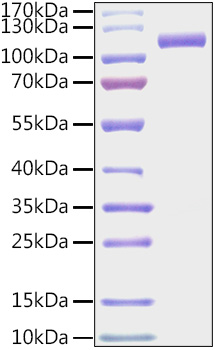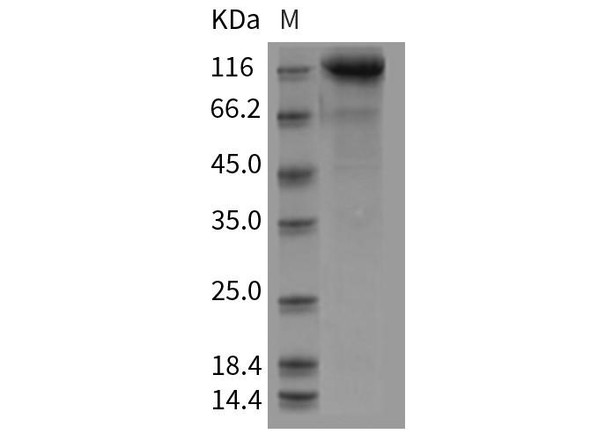Description
Recombinant Mouse CDCP1/gp140/CD318 Protein
The Recombinant Mouse CDCP1/gp140/CD318 Protein is a high-quality recombinant protein designed for murine biological research applications. This protein serves as an essential reagent in mouse model studies, comparative immunology research, and preclinical therapeutic evaluations, enabling scientists to investigate CDCP1/gp140/CD318 biology and its relevance to human disease mechanisms through translational research approaches.
This product (SKU: RPCB0962) is produced using HEK293 cells and features a C-His&Avi tag for convenient detection and purification. The protein exhibits a calculated molecular weight of 75.06 kDa with an observed molecular weight of 110-120 kDa under denaturing conditions, achieving ≥ 95 % as determined by SDS-PAGE., ensuring exceptional quality and consistency for research applications.
Key Features
| High Purity by Affinity Chromatography | |
| Mammalian & Bacterial Expression Systems | |
| High lot-to-lot consistency via strict QC |
| Product Name: | Recombinant Mouse CDCP1/gp140/CD318 Protein |
| SKU: | RPCB0962 |
| Size: | 10 μg , 20 μg , 50 μg , 100 μg |
| Reactivity: | Mouse |
| Synonyms: | CDCP1, CD318, SIMA135, TRASK, UNQ2486, PRO5773, CDCP1 |
| Tag: | C-His&Avi |
| Expression Host: | HEK293 cells |
| Calculated MW: | 75.06 kDa |
| Observed MW: | 110-120 kDa |
| Gene ID: | 109332 |
| Protein Description: | High quality, high purity and low endotoxin recombinant Recombinant Mouse CDCP1/gp140/CD318 Protein (RPCB0962), tested reactivity in HEK293 cells and has been validated in SDS-PAGE.100% guaranteed. |
| Endotoxin: | < 0.1 EU/μg of the protein by LAL method. |
| Purity: | ≥ 95 % as determined by SDS-PAGE. |
| Formulation: | Lyophilized from a 0.22 μm filtered solution of PBS, pH 7.4. |
| Reconstitution: | Centrifuge the vial before opening. Reconstitute to a concentration of 0.1-0.5 mg/mL in sterile distilled water. Avoid vortex or vigorously pipetting the protein. For long term storage, it is recommended to add a carrier protein or stablizer (e.g. 0.1% BSA, 5% HSA, 10% FBS or 5% Trehalose), and aliquot the reconstituted protein solution to minimize free-thaw cycles. |
| Storage: | Store at -20℃.Store the lyophilized protein at -20℃ to -80 ℃ up to 1 year from the date of receipt. After reconstitution, the protein solution is stable at -20℃ for 3 months, at 2-8℃ for up to 1 week. |
CDCP1 contains three extracellular CUB domains. It is a putative stem cell marker that is highly expressed in some human cancer cells and both, typical and atypical (cancerous) colons. It interacts with CDH2/N-cadherin, CDH3/P-cadherin, SDC1/syndecan-1, SDC4/syndecan-4 and the serine protease ST14/MT-SP1. It also interacts with SRC and PRKCG/protein kinase C gamma. CDCP1 is taken as a key regulator of EGF/EGFR-induced cell migration. It has been shown that signaling via EGF/EGFR induces migration of ovarian cancer Caov3 and OVCA420 cells with concomitant up-regulation of CDCP1 mRNA and protein. Consistent with a role in cell migration CDCP1 relocates from cell-cell junctions to punctate structures on filopodia after activation of EGFR. It may be involved in cell adhesion and cell matrix association. It also may play a role in the regulation of anchorage versus migration or proliferation versus differentiation via its phosphorylation. It has been taken as a novel marker for leukemia diagnosis and immature hematopoietic stem cell subsets.







